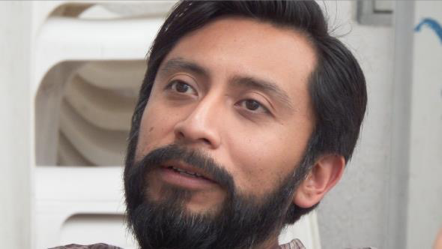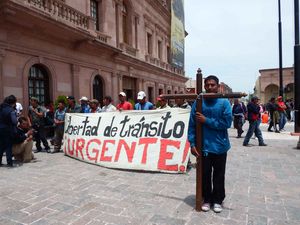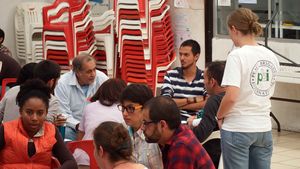Mexico City, 1 June 2015.- Between May and December 2015, PBI Mexico will publish a series of interviews with Human Rights Defenders which we accompany or with whom we maintain a close relationship. This month we present an interview with Alberto Xicotencatl, director of Saltillo Migrant House.
The Saltillo Migrant House offers humanitarian aid to the transmigration population that comes through the city. In addition, they document cases of torture, aggression, kidnappings, extortions and other abuses that this population suffers while passing through Mexico and legal assistance is offered to place official complaints for these attacks. Due to the attacks against the workers of Saltillo Migrant House, since 2010, the Inter-American Commission for Human Rights, has granted protection measures on behalf of the Saltillo Migrant House.
The Saltillo Migrant House has been an awarded with the Lettelier-Moffitt Prize by the Institute for Policy Studies in the United States.
The team of Saltillo Migrant House is supported by PBI since February 2014 through international accompaniment.
Alberto Xicotencatl, human rights defender of migrants
My name is Alberto Carrasco Xicotencatl. I am working with the migrant population, 99 percent of whom are undocumented persons in transit through Mexico going to the United States. I am a social psychologist and with this training I try to address the immigration issue and all its complexities.
I work in an organization known as the Saltillo Migrant House, whose legal name is Frontera con Justicia (Border with Justice Association). We are located in Saltillo, which is the capital of Coahuila, a state on the border between Mexico and the United States.

Photo: Alberto Xicotencatl Carrasco, director of the Saltillo Migrant House © PBI Mexico
I could never understand or accept that small groups of people have access to things such as a college education and that a huge section of the population lives their lives without access to so many basic needs in health care, in education, in everything. I decided to work against these imbalances in the society. I have worked in the field of indigenous community development and in education with vulnerable populations such as street children, teenagers and with indigenous communities. Life took me into the immigration issue.
For a time, my colleagues and I from the Saltillo Migrant House defined ourselves as people trying to help and accompany migrant persons. Calling ourselves human rights defenders was a name too big for us. We thought this label belonged to people working in larger organizations. For us, human rights defenders are people that make structural changes in a society. It took us a while to realize that the changes we were pulling ahead, together with the population of Saltillo, were structural changes. In Saltillo, when we arrived, the community gathered signatures asking us to close the migrant shelter and the neighbors were throwing stones at the house. Today, those same people bring us food for the migrants. That is a structural change; a change that transforms reality.
Now we assume that we are human rights defenders.
This work has a price, a high price on a personal level. The time you spend with your family, your couple, and the time you rest is always narrowing. I cannot treat this as a job but as a way of life. This work becomes like a child who is dependent on you and you have to give things up, such as other studies, a conventional life, or to be able to disconnect during the holidays.
Saltillo Migrant House: the struggle for the rights of the migrant population
We demand, on behalf of the whole migrant population: the rights to free movement, to health, to a fair trial, to due process, to have a nationality, to be sheltered, to count on international protection, to enjoy a life free of violence, to health and to the right to keep one’s properties.
What moves us as a team at the Saltillo Migrant House is seeing the unnecessary pain experienced by migrant people when their rights are violated. It is not a natural pain coming from a disease. The source of this pain is the denial of the existence of rights for these people. We work to minimize that unnatural pain. This requires changing structures. We had to gain knowledge about something we didn’t know about while we were learning the process.
Here in Mexico, a legislative change is a basic need. This is an issue we've driven at without results. The current immigration policy is the result of an economic system that has impoverished entire populations who are paying the cost. The system forces them to migrate, become migrants, because there is no other option. Legally they do not exist. The law does not allow the documentation of these impoverished migrants. A first step would get them out of anonymity and to give them legal recognition. After that, a campaign would be necessary, to ensure that the state guaranties that their rights will be protected.
I cannot prevent migration from being hindered. I can work as much as I want but it will not be free. So if they are going to hinder it, if there is going to be an immigration control, this should be done as humanly as possible. They say that migrants are treated as a commodity, but it is not true, because the goods are not being cared for, nor do they reach their destination intact. Migrants don’t even have that. It sounds terrible, but the goal is to fight so that, at least, they should be treated the same as goods. They should be cared for. They should reach the United States or be sent back to their countries physically and psychologically healthy.
A work facing aggression and violence
The whole team has experienced assaults, attacks, harassment and death threats. When that happens, life is completely transformed. The issue of security is an everyday thing because we do not know when the aggressions could come. One must always take care of each step and we cannot say that today I do not care. Attacks have increased since 2009 to date. There are periods of relative calm, and there are months without any incident, but after a while the pressure is reactivated.
When you defend human rights these become limitations. But you choose. You choose not to have some freedoms. I cannot afford to return home at 5 a.m. from a wedding, I cannot forget to check that all the doors of my house are locked. It sounds simple but in the end life changes. When we have a program, we have to tell a colleague where we're going, at what time we expect to arrive. Private life cannot be so private any more. You have to watch what you write on social networks. I don’t have the freedom to express what I think because it could be misinterpreted and damage the organization.
An example of an aggression we have gone through was a campaign to discredit us orchestrated by the authorities in 2013.
We documented 35 cases of torture against migrants committed by the municipal police. They were things such as sexual assaults on women, torture of parents in front of the children, electric shocks to the genitals, and putting gas and hot water into the nostrils. We thought those things were part of the past in Saltillo, because this is a small town, very attached to the United States. We made those cases public and they became a media scandal. The authorities called us. They said they were very worried that they would investigate and there would be exemplary sanctions because those were acts that affected the public image of the state. However, later on, the same authorities said before the press and television that we had invented the cases and that we were an organization that was only seeking international financing. They accused me of diverting resources and said in general that the cases did not exist. They began a campaign saying that we were supporting criminals because these allegedly tortured migrants were actually part of organized crime.

Photo: Migrant Via Crucis in Saltillo, initiative accompanied by volunteers of PBI Northern team © PBI Mexico
Part of the community knows us and we have social support, but another part is left with many questions. What if it's true? What if they really are diverting resources? What if they are getting money for every scandal and Alberto is becoming a millionaire? These smear campaigns make us go back. They undo steps that took us years to walk.
In Coahuila there is a group of elite state police investigating federal crimes, highly armed and with military training. In 2013 they also came to the Saltillo Migrant House and tried to claim that we were harboring criminals inside. They threatened us saying that the next time they would enter by force. They said, we know where to go and we will get in. They came armed, wearing balaclavas, without showing their faces and without carrying identification.
We also have been threatened by the so called organized crime. Luxury vans have surrounded the Saltillo Migrant House and have stopped outside and taken pictures. In our migrant shelter some German volunteers were collaborating with us. An armed group threatened them and tried to enter the House. The German embassy asked these volunteers to leave the country. One of the team members has been detained and threatened by men who also took away his cell phone. Three years ago, when I came to my home, some people tried to get me out of the car. I was able to react quickly and I escaped, but they were at the door of my house and they told me that they already knew where I lived.
Some members of the organization decided to stop working when these attacks started. Those of us who are here now have had the strength to endure because we know how to react. We have to be careful, but we are not afraid. We do not live scared but alert and that we have learned with practice. You get used to living at risk. This does not mean that it does not affect us. Of course, living always alert involves psychological strain. But as a team we share a lot and part of the time that we give ourselves is for asking each other how we are? How do we feel?
The uses of having a presence of international human right organizations in Saltillo such as PBI
In Saltillo an organization like PBI helps us not feel alone. In the North we are few human rights organizations. The community of supporters in Mexico City has established networks, they constantly communicate and meet, there are forums, and knowledge.
But the north is an industrial area. Here universities focus their careers and their educational offers in topics related to companies or economy. In the end, those of us dedicated to social issues and human rights are very few. We have few opportunities to develop our training, to think and reflect together and to devise strategies to improve our safety. So it's important to have here an organization that, to the extent of its possibilities, is neutral, and has political pressure procedures inspired by pacifism such as PBI. This brings an alternative approach to our thoughts, offers ways of working that maybe we would not have as accessible before and it placed new eyes here, where there were not previously eyes. How many international organizations are present in the north in places like Saltillo? Not one.
The presence of PBI makes us feel accompanied by someone with whom we share a language. We share goals. They accompany our work and defend our right to defend human rights. We appreciate this presence and platform because if PBI was not here no one would give to us. The work, when shared, is charged with more lightness. It is not so heavy, so because of this, it helps us a lot and it is important that an organization like PBI is here.

Photo: Member of the Saltillo Migrant House and migrant community during a security workshop facilitated by PBI © PBI Mexico
An example of the support offered by the Saltillo Migrant House: The story of an undocumented Salvadoran migrant
About three years ago, a migrant from El Salvador came here. She was fleeing from domestic violence, and her husband beat her and threatened to kill her. Her idea was to flee her husband’s violence. When she reached Guatemala she became sexually exploited. Due to her vulnerability she was the perfect victim. She managed to escape from the traffickers and to come to Mexico. In Mexico she went walking without any aim and eventually she reached Saltillo. She did not see herself as a victim. Fleeing the husband she had abandoned her children, so she felt guilty about leaving them and thought that she deserved what had happened in Guatemala. She said, “it is the cost I have to pay for being worse than a bitch, because an animal does not abandon its children. What happened is what I deserve.”
We proposed her to seek refuge. It was the first case of shelter that we accompanied as an organization. We also accompanied her process of psychological recovery since she needed to see herself as a victim of a system, a husband, a network of trafficking and then as a survivor and to reflect on how to go ahead. Fortunately, the state acknowledged her shelter status and she assumed herself to be a victim. A strong empowerment process started, she achieved independence from the Saltillo Migrant House and got a job. She has had many problems in her works because, although she is regularized in Mexico, employers keep seeing her as a migrant (without rights) and she has to fight for her labor rights. But she managed to get ahead. She was able to return home to reunite with her daughters, to ask them for forgiveness for what she thinks she has done wrong. She knows that her daughters have achieved a certain age and are able to make decisions. She's invited them to come to Mexico but the daughters do not want to. Then she says, "it is their right to not come with me, but my right is to not return to Salvador. I live in Mexico, and of course it makes me sad and it hurts to say goodbye but I assume they have a life, and I have mine and I want to live in Mexico."
To date we continue to accompany her during her process of mental recover. It is a complex work to accompany her psychologically, but I think it's one of the cases we see as a very good and successful practice.
* This interview was conducted by Susana Nistal and translated by Annie Hintz
